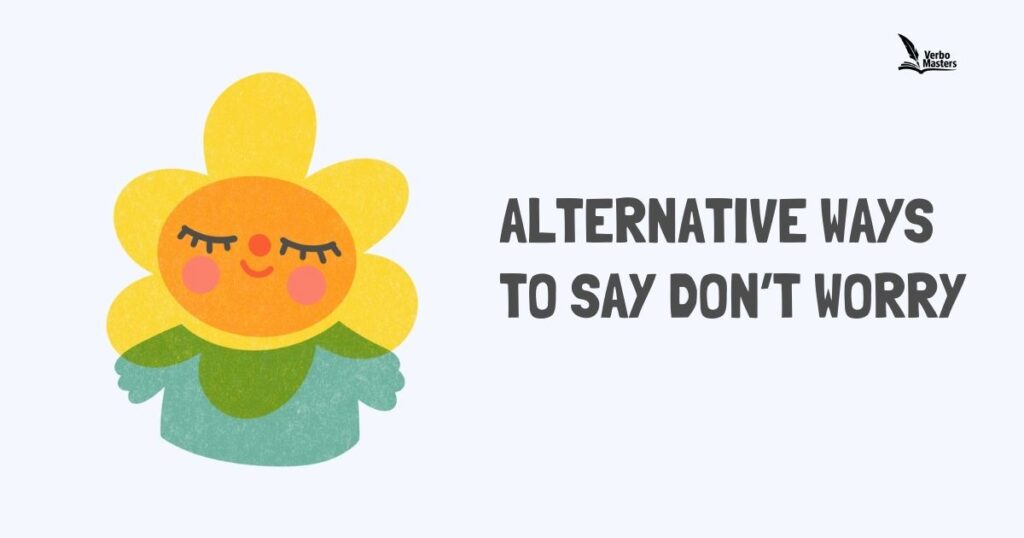There are many ways to tell someone don’t worry without using the same phrase every time. Whether you want to reassure a friend, calm a colleague, or ease someone’s anxiety, having alternatives can help. Different situations call for different tones sometimes you want to sound more casual, other times more formal.
Using a variety of expressions makes your communication feel natural and genuine. Below are 150 alternatives ways to say dont worry, each with its own nuance. These phrases will help you provide comfort and show empathy in various scenarios.
You can also read; Examples of Noun sentences
Alternative ways to say dont worry

Alternative ways to say don’t worry to help you express reassurance in different situations:
- No need to stress.
- Everything will be fine.
- It’s all good.
- Take it easy.
- Don’t sweat it.
- It’s not a big deal.
- Don’t fret.
- There’s no need to panic.
- Stay calm.
- Everything’s under control.
- Don’t lose sleep over it.
- Chill out.
- No worries.
- Relax, everything’s fine.
- You’ve got this.
- It’ll be okay.
- Keep your cool.
- Take a deep breath.
- We’ll get through it.
- You don’t have to stress.
- All will be well.
- It’s nothing to worry about.
- Keep calm and carry on.
- It’s all going to work out.
- Don’t get worked up.
- There’s no reason to be concerned.
- Don’t let it bother you.
- Let’s not panic.
- No need to be anxious.
- Don’t get stressed out.
- It’s going to be alright.
- You’re fine.
- Everything’s going to be okay.
- Don’t let it get to you.
- Don’t let it weigh on you.
- Stay relaxed.
- It’s all good in the end.
- There’s no cause for alarm.
- No need to worry about that.
- Let it go.
- Take it one step at a time.
- Relax, you’re doing great.
- We’ll figure it out.
- Nothing to stress over.
- Let’s not make a big deal of it.
- It’s not worth worrying about.
- Don’t give it a second thought.
- You’ve got it under control.
- There’s no reason to stress.
- Don’t get too anxious.
- You’ll be fine.
- Let’s stay positive.
- Don’t let it overwhelm you.
- It’s no biggie.
- No need to panic.
- Don’t let it take over.
- Keep your head up.
- It’s all smooth sailing.
- Everything will sort itself out.
- Take it slow.
- You’re in good hands.
- We’ve got this handled.
- Don’t overthink it.
- No need to get upset.
- It’s all part of the process.
- Stay positive.
- Don’t let the stress get to you.
- It’s just a small thing.
- Don’t be so hard on yourself.
- It’s just a bump in the road.
- Take a step back.
- Nothing to worry about here.
- Don’t make it bigger than it is.
- Don’t get caught up in it.
- You’re all set.
- No need to rush.
- Everything’s taken care of.
- Nothing’s going to go wrong.
- It’s just a minor setback.
- Don’t let it get to you.
- It’s really not that serious.
- Everything will fall into place.
- Stay cool, calm, and collected.
- It’s not a disaster.
- It’s really no trouble at all.
- There’s no need to freak out.
- You’ve got this covered.
- Keep your chin up.
- Nothing is going to stop you.
- Let it be.
- Don’t let your mind race.
- There’s no reason to worry.
- Don’t get all worked up.
- Stay chill.
- Don’t let it bother your peace of mind.
- Don’t be so anxious.
- Everything will be okay in the end.
- Let’s keep our heads.
- No need for concern.
- You’ve got everything in hand.
- Stay confident.
- Don’t let this get you down.
- Take it easy, no rush.
- It’s not worth stressing over.
- Everything’s just fine.
- Don’t sweat the small stuff.
- No need to go into panic mode.
- Keep things in perspective.
- It’ll all work out in the end.
- Let’s just relax.
- Don’t let it take over your thoughts.
- It’s just a little hiccup.
- Things will settle down.
- Don’t overdo it.
- Stay composed.
- Don’t get anxious about it.
- It’s nothing you can’t handle.
- There’s nothing to be afraid of.
- There’s no rush.
- It’s going to smooth out soon.
- Let it slide.
- You’re doing great, just keep going.
- Don’t stress about the small stuff.
- No worries at all.
- Everything is under control here.
- It’s going to be a breeze.
- It’s no trouble at all.
- Relax, we’ve got time.
- Don’t let it cause you any trouble.
- You’re on the right track.
- Don’t waste energy on it.
- Stay calm, all is well.
- You’re good to go.
- There’s no need to get upset.
- It’ll all be fine in the end.
- Don’t overreact.
- Nothing is going to get in your way.
- It’s no big deal, really.
- Don’t get caught up in it.
- Take it in stride.
- We’ve got everything under control.
- There’s no need to get frantic.
- Keep it together.
- Take a breath and relax.
- It’s no issue at all.
- We’ll make it through.
- Don’t let it stress you out.
- Everything’s going as planned.
- Stay focused, everything’s fine.
- No need to get panicked.
These alternative phrases provide comfort in various situations and help maintain a calm atmosphere. Whether you need to reassure someone, calm nerves, or keep things light, these phrases can work in different contexts.
FAQs
What are some common ways to say don’t worry?
Common alternatives include phrases like “Everything will be fine,” “No need to stress,” “It’s all good,” or “You’ve got this.” Each of these helps to reassure others.
When should I use don’t worry alternatives?
You can use these alternatives whenever someone is anxious or stressed. They help to ease tension and provide comfort, whether in casual conversations or more serious situations.
Are these alternatives formal or informal?
The alternatives provided range from casual to more neutral tones. Phrases like “Take it easy” are casual, while “Everything will be okay” is neutral and can be used in formal situations.
Can I use these phrases in professional settings?
Yes, many of these alternatives, such as “Everything will be fine” or “No need to worry,” are perfectly suitable for professional environments, offering reassurance in a respectful way.
How can I use these phrases in a text message?
In a text, you can send a simple message like “No worries, all is good” or “Don’t stress, it’ll work out.” These can be reassuring without being overly formal.
How do I say don’t worry without sounding dismissive?
To avoid sounding dismissive, use phrases that show empathy, such as “I understand how you feel, but everything will be fine,” or “It’s okay, take a deep breath.”
Are there cultural differences in using these phrases?
Yes, some cultures may have specific expressions for reassuring someone. It’s important to be aware of these cultural nuances when offering comfort in different regions.
Can these alternatives be used for any situation?
These alternatives work for a variety of situations, from casual to stressful moments. However, it’s important to consider the context to ensure your reassurance is appropriate for the situation.
Do these phrases work for everyone?
While they can be helpful for most people, some individuals may need a more specific or heartfelt response depending on the situation. Adjusting your tone can make a big difference.
How do I know which phrase to choose?
Choose a phrase based on the person’s mood and the situation. If they’re extremely stressed, a more comforting and empathetic response may be better, such as “You’re not alone in this.”
Conclusion
Reassuring someone is all about offering comfort and support. Instead of simply saying “don’t worry,” you can use many alternatives to show empathy. These phrases can help calm nerves and ease stress, whether in a personal or professional setting. For example, “Everything will be fine” or “You’ve got this” is a great way to provide reassurance. They not only ease worries but also encourage a positive outlook.
Choosing the right words depends on the situation and the person you’re speaking to. Whether the person is anxious about work or a personal issue, these alternatives can help maintain a sense of calm. It’s important to match the tone to the situation. With the right phrase, you can make others feel more relaxed and confident, no matter what’s going on.

I’m John Smith, a language enthusiast dedicated to helping writers, students, and professionals master the art of clear and effective communication. Whether you’re looking for grammar tips, writing guides, or common mistake corrections, you’ll find valuable insights to improve your language skills. Let’s make grammar simple and fun!

